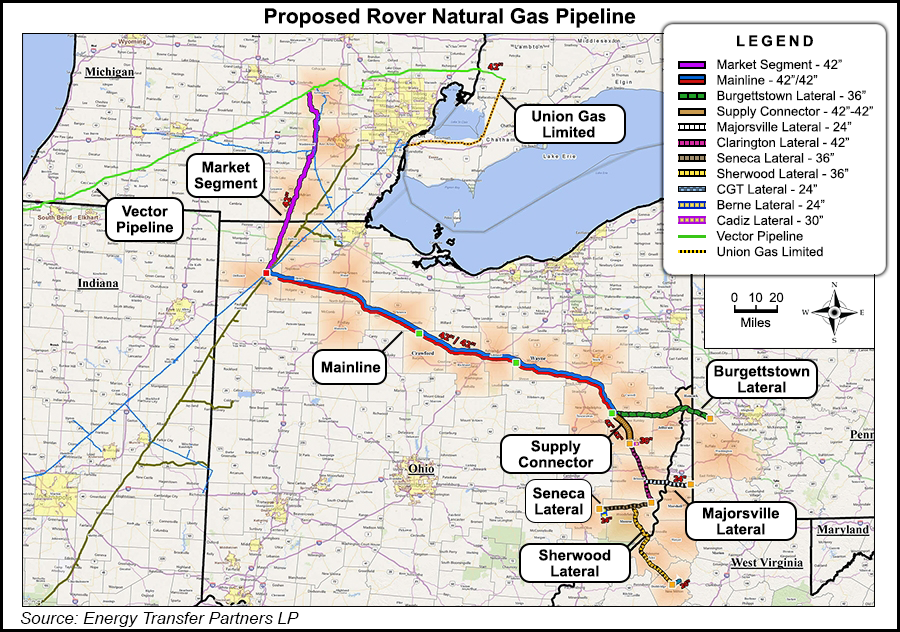Marcellus | E&P | NGI All News Access | Utica Shale
Rover NatGas Pipeline Sues For Survey Access in Michigan
In the latest legal challenge over pipeline development in the region, Rover Pipeline LLC has filed more than a dozen lawsuits in three southern Michigan counties against landowners who have denied the company access to their property for surveys.

The 711-mile Rover, which is being developed by Energy Transfer Partners LP (ETP), would carry Marcellus and Utica shale gas from West Virginia, Pennsylvania and Ohio to an interconnect with the Vector Pipeline in Michigan. ETP spokeswoman Vicki Granado said the lawsuits were necessary to gain survey access along the proposed route and noted that they were filed against “very few landowners.” The company has approached more than 300 property owners in the state, but it filed most of the 17 lawsuits in Washtenaw County, along with others in Lenawee and Livingston counties.
Rover filed with FERC to construct its mainlines, supply laterals, compression stations and other facilities in February (see Daily GPI, Feb. 23). As part of the filing, the company said last week that it has provided updated maps with local libraries and government offices in counties through which the route is proposed. When it was announced last June, Rover was set to go through other counties in Michigan before it faced opposition in some parts of the state (see Shale Daily, June 26, 2014).
The company said last week, however, that the route continues to be adjusted as survey work is completed. ETP also hired Ohio-based Land Stewards LLC to provide consulting services to landowners affected by pipeline development to minimize the impact of land-use and help restore properties.
The pipeline would transport 3.25 Bcf/d of natural gas from processing plants in West Virginia, Ohio and Pennsylvania to pipeline interconnects in West Virginia and Ohio, as well as the Midwest Hub near Defiance, OH. Up to 68% of the gas will be delivered for distribution to markets across the United States, while the rest will be delivered to markets in Michigan via an interconnect near Livingston County with the Vector pipeline, which would also move gas to Ontario, Canada.
The company’s lawsuits in Michigan cite state law that allows access for surveying.
The pipeline’s in-service dates are expected to be phased-in between 2016 and 2017, and ETP said last year that Rover was fully subscribed (see Daily GPI, Oct. 31, 2014). Granado said the lawsuits are not expected to affect the project’s timeline.
Rover is the latest pipeline to face challenges in the region. Earlier this month, Mountain Valley Pipeline LLC, a joint venture of EQT Corp. affiliates and NextEra Energy Inc., filed lawsuits against more than 100 landowners in West Virginia to gain access for surveys (see Shale Daily, April 7). The 300-mile Mountain Valley, would deliver Marcellus and Utica shale gas to markets in the mid-Atlantic and Southeast (see Shale Daily, Oct. 29, 2014).
Elected officials in 18 Ohio communities, meanwhile, have either passed resolutions opposing the NEXUS Gas Transmission system or sent letters in support of changing its proposed path to minimize environmental and residential impacts (see Shale Daily, March 30). NEXUS, which is backed by Spectra Energy Corp., DTE Energy and Enbridge, Inc., would stretch 250 miles to connect Marcellus and Utica shale gas to markets in Ohio, Michigan and Canada.
© 2024 Natural Gas Intelligence. All rights reserved.
ISSN © 2577-9877 | ISSN © 2158-8023 |
